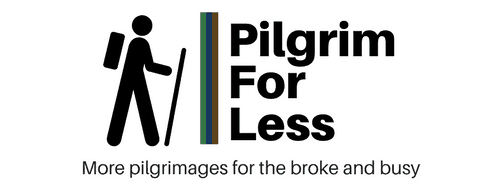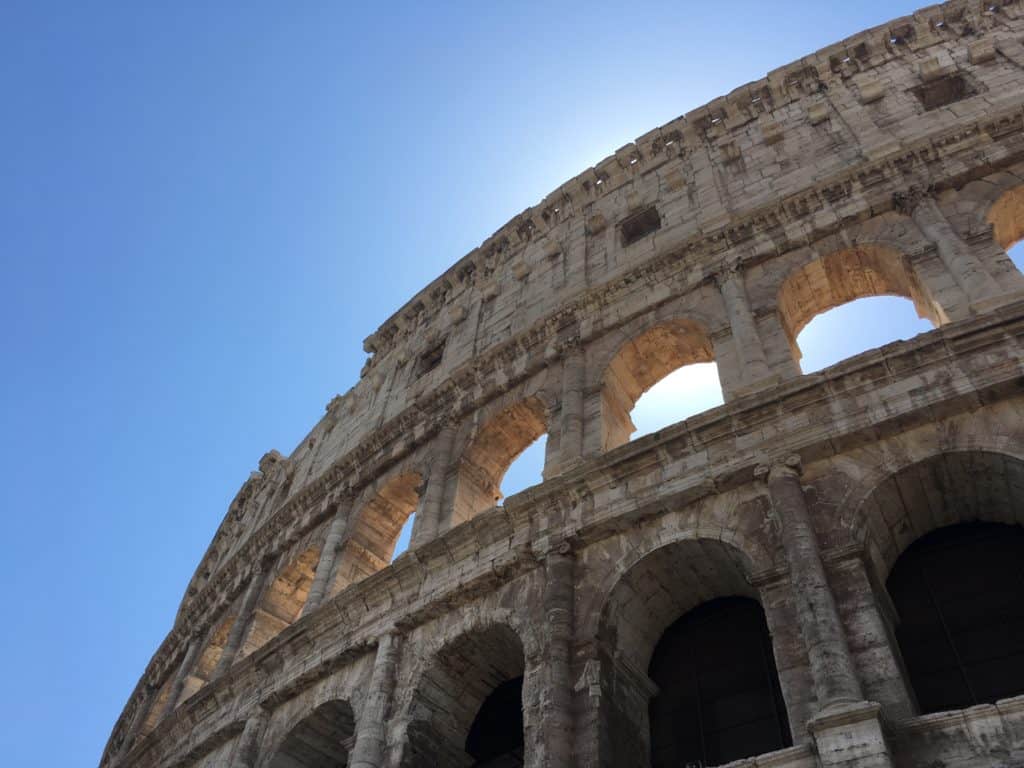Mmm, pilgrimages. When I say the word “pilgrimage”, it likely brings up thoughts of long journeys visiting holy or sacred sites from the ancient world. Place yourself in those thoughts. Maybe you smell a little, but at least you’ve got your trekking pole and hiker’s backpack. Your feet are tired from walking 10 miles today, and your sandal straps are frayed, but comfy. You’re still mentally and emotionally processing seeing beautiful sites, including that captivating grotto that stirred an inner sense of peace previously unknown. And that wasn’t even the most elegant sanctuary of the ancient basilica that you intentionally set out on this pilgrimage for where you fervently prayed for your utmost special intentions while rubbing elbows with other pilgrims at a packed Mass.
Maybe. Maybe not.
Or maybe when I say “pilgrimage”, it brings up thoughts of the practical aspects. You know, spending thousands of dollars to go to Italy or the Holy Land for a week or two. Or maybe it’s a month-long trip with a heavy backpack walking 500 miles across France and Spain on the Camino De Santiago. Lots of walking. Lots. The train rides were confusing, but conquerable. “Where’s the restroom?” in Italian, German, and Spanish are tattooed in your travel notebook. Finding an English Mass was impossible, so you settled for Portuguese one. You struggle to remember the exchange rate between Israeli shekels and US dollars because you want to buy that olive wood crucifix that you’ve been eyeing.
Perhaps. Or perhaps not.
Your Definitions of Pilgrimage
Before starting Pilgrim for Less, I sent out a survey to a handful of people. One of the questions I asked was, “In your own words, what is a pilgrimage?” Here are a selection of some of those answers:
“Visiting sacred places and places that is also in the bible”
“Spiritual journey”
“Pilgrimage is a journey to a religious place that can nourish your soul and uplift your spiritual life.”
“A walk, tour, or observance in a place, event, or structures that aims spiritual and personal transformation”
“A trip to focus on your spiritual life and be reminded of how our life is meant to be a journey to heaven.”
“A pilgrimage is a journey we take to experience God in a more intimate way”
“A pilgrimage is a journey which challenges you physically, mentally, and spiritually. I believe that physically and mentally challenging ourselves oftentimes turns our thoughts to Jesus’ suffering. When we suffer with Him we glorify Him. Pilgrimages are those journeys we take that free us from the distractions and monotony of our every day lives, and help us to discover our true selves and to recenter ourselves on Christ.”
“To go on a trip to holy or sacred sites.”
“A journey of searching for God’s will”
And many of the other responses I received were similar. I think most of my survey takers and readers have a good general sense of what pilgrimages are as these responses above are not far off.
My Definition of Pilgrimage
If I were to give an Aristotelian-styled answer of what a pilgrimage is, I would say that it is an intentional journey involving travel by an individual to places of sacred significance to encounter God. I think it’s important to note that pilgrimages are intentional because they don’t happen accidentally. And I would also stress that the final end of a pilgrimage is to have that encounter with God. Without these things, a pilgrimage would just be any other kind of trip.
Of course, that’s how I’d define a pilgrimage. We’ll continue exploring and discussing further in detail what pilgrimages are on this site.
Expert Definitions of Pilgrimage
Fr. Hardon’s Modern Catholic Dictionary defines pilgrimages as:
“a journey to a sacred place undertaken as an act of religious devotion. Its purpose may be simply to venerate a certain saint or ask some spiritual favor; beg for a physical cure or perform an act of penance; express thanks or fulfill a promise” (p. 422)
He goes on to describe how pilgrimages started out with going to Holy Land and later Rome where many saints were martyred. And in Medieval Times, pilgrimages were assigned as an act of public penance on a grand scale.
The Catechism of the Catholic Church has a few things to say regarding pilgrimages:
1198 In its earthly state the Church needs places where the community can gather together. Our visible churches, holy places, are images of the holy city, the heavenly Jerusalem, toward which we are making our way on pilgrimage.
2691 … Pilgrimages evoke our earthly journey toward heaven and are traditionally very special occasions for renewal in prayer. For pilgrims seeking living water, shrines are special places for living the forms of Christian prayer “in Church.”
2696 The most appropriate places for prayer are personal or family oratories, monasteries, places of pilgrimage, and above all the church, which is the proper place for liturgical prayer for the parish community and the privileged place for Eucharistic adoration.
Bottom Line
Before we discuss about going on pilgrimages for less, it’s important to know what they are in the first place!
Pilgrimages involve spiritual and travel aspects with a particular goal or intention in mind, usually due to religious devotion. I hope these definitions above give you a better idea of what pilgrimages are.
And now that you know–share this post with a friend! (use the sharing links!) And do you have any questions for me on what are pilgrimages? Let me know in the comments!
References
Hardon, John A., S.J. (2008). A Modern Catholic Dictionary. Bardstown, KY: Eternal Life.
Catechism of the Catholic Church on Vatican.va
Don’t miss future posts! Enter your email below to join Pilgrim for Less readers!

JR is a full-time engineer working in the aerospace industry. Apart from having such a fly job, he flies unto the arms of Our Lady and the Church pursuing his faith and a relationship with Christ. Over the past several years, faith and flying via pilgrimages became a thing. When he’s not being fly, JR hangs out with family, friends, his chihuahua, and with thoughts of the next trip.

